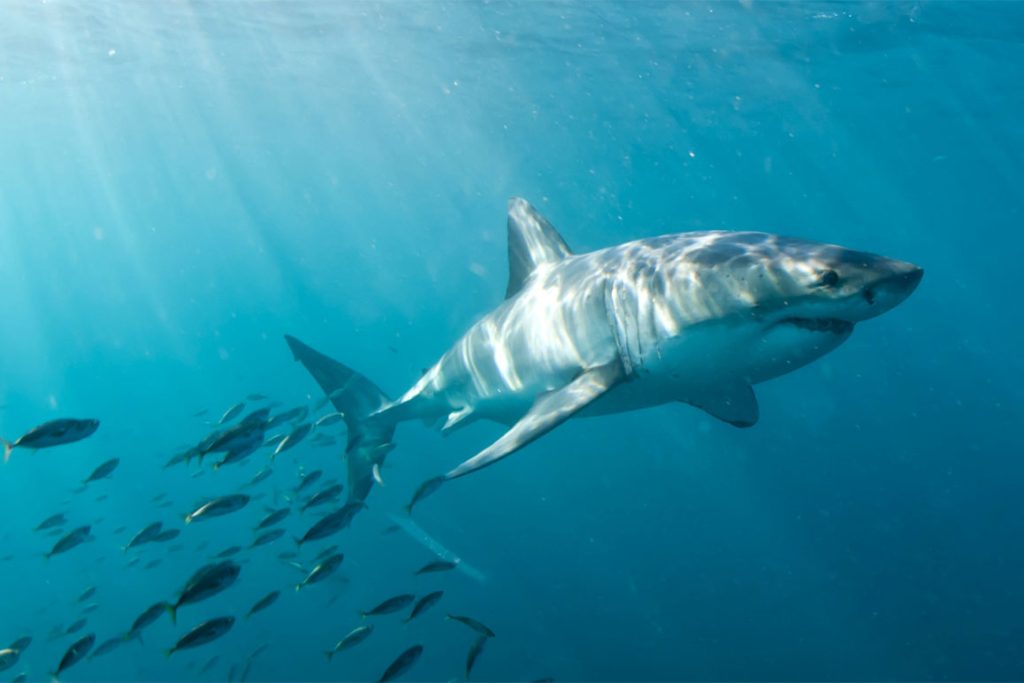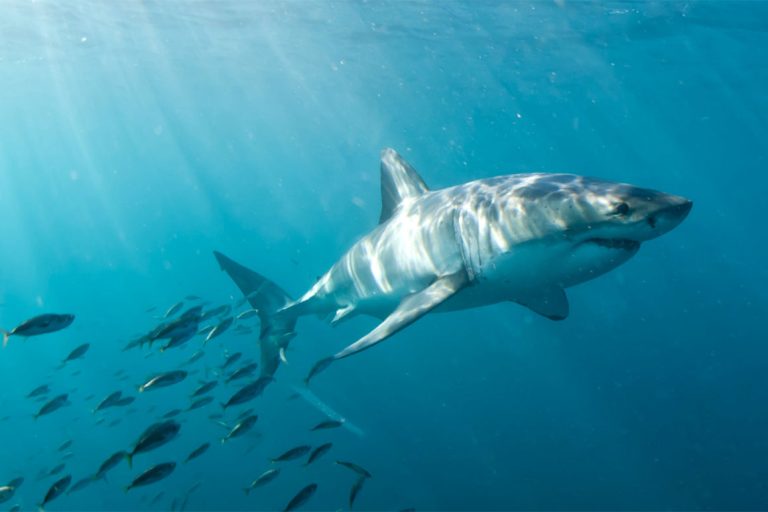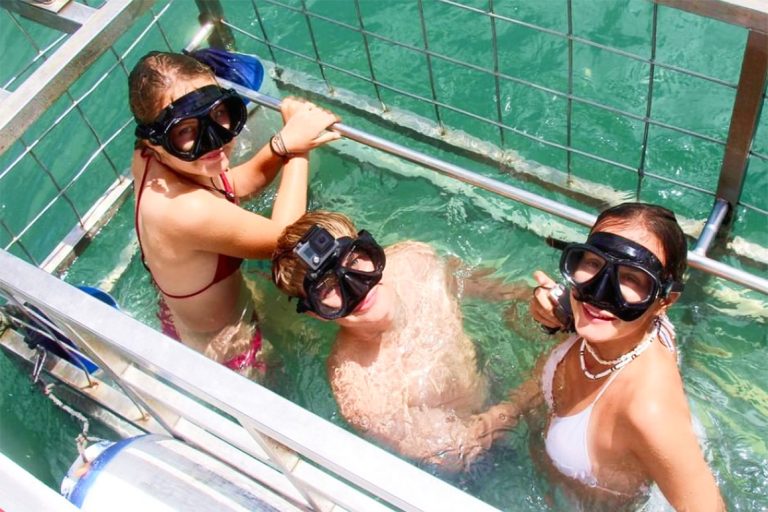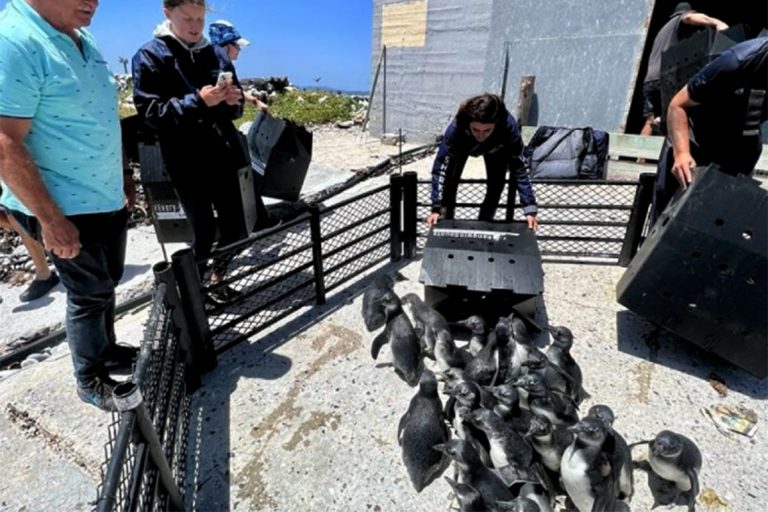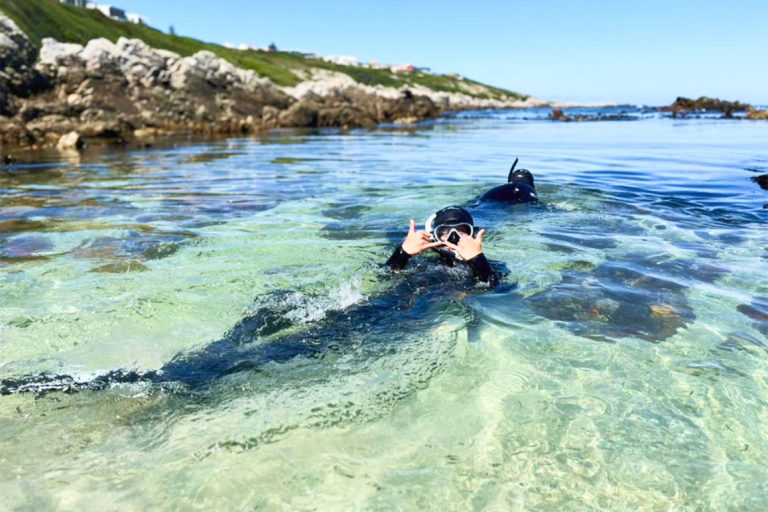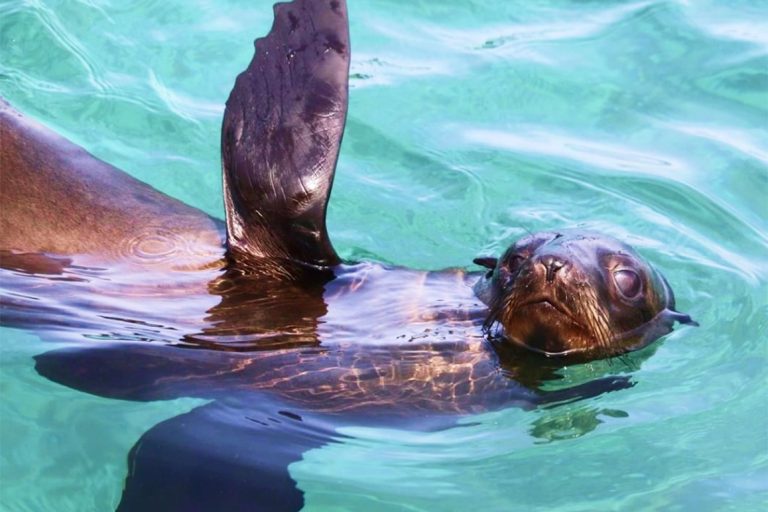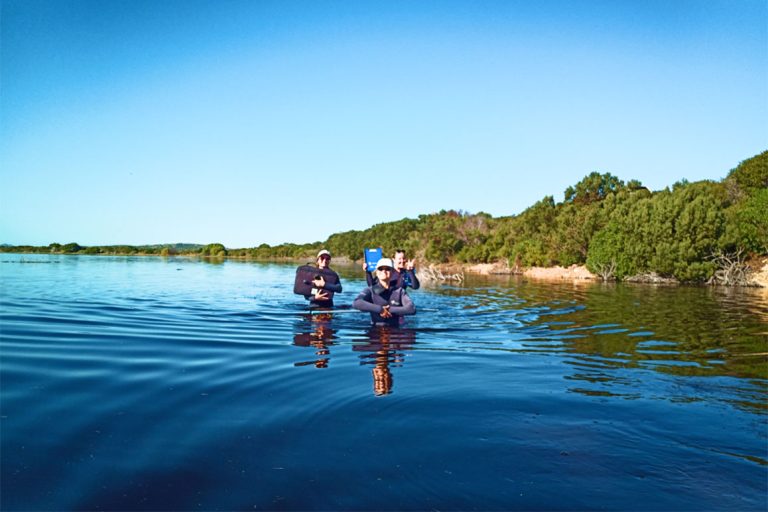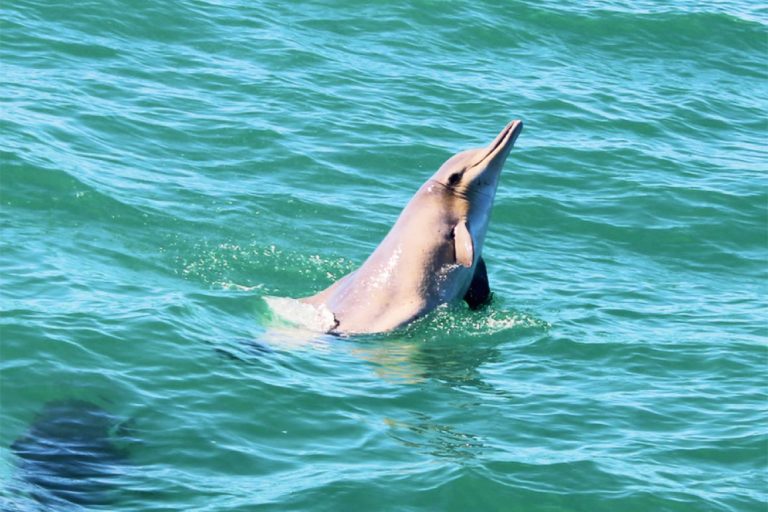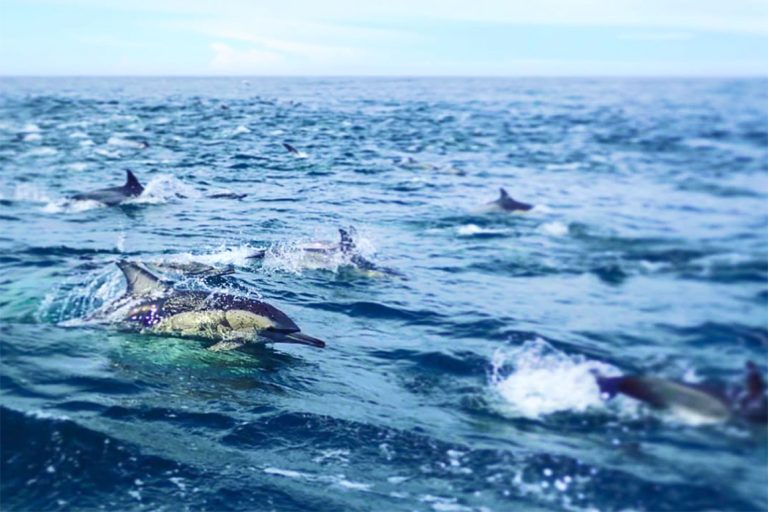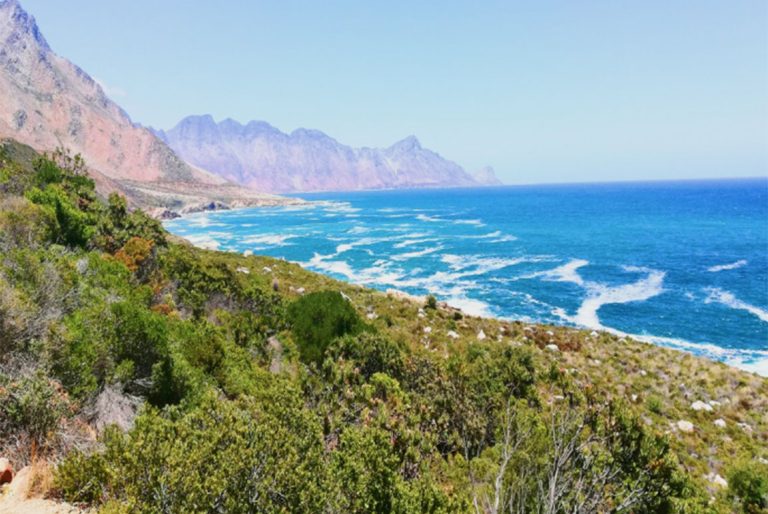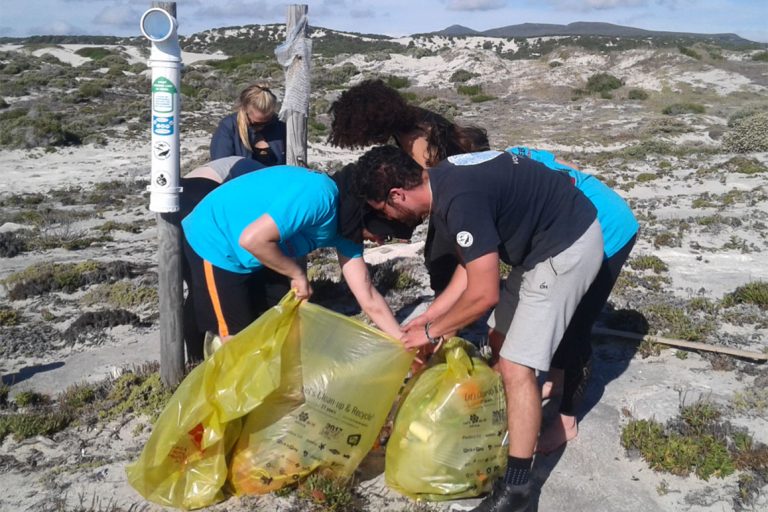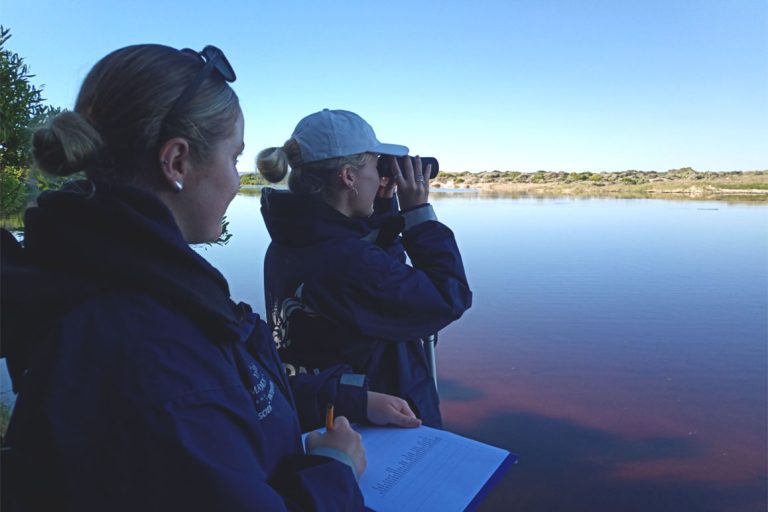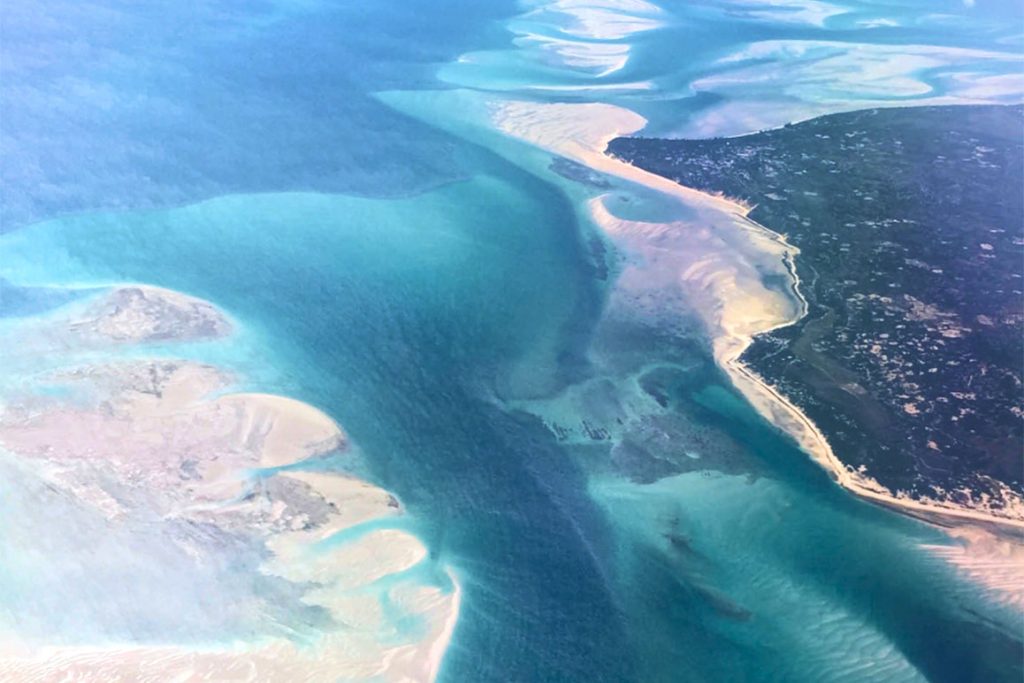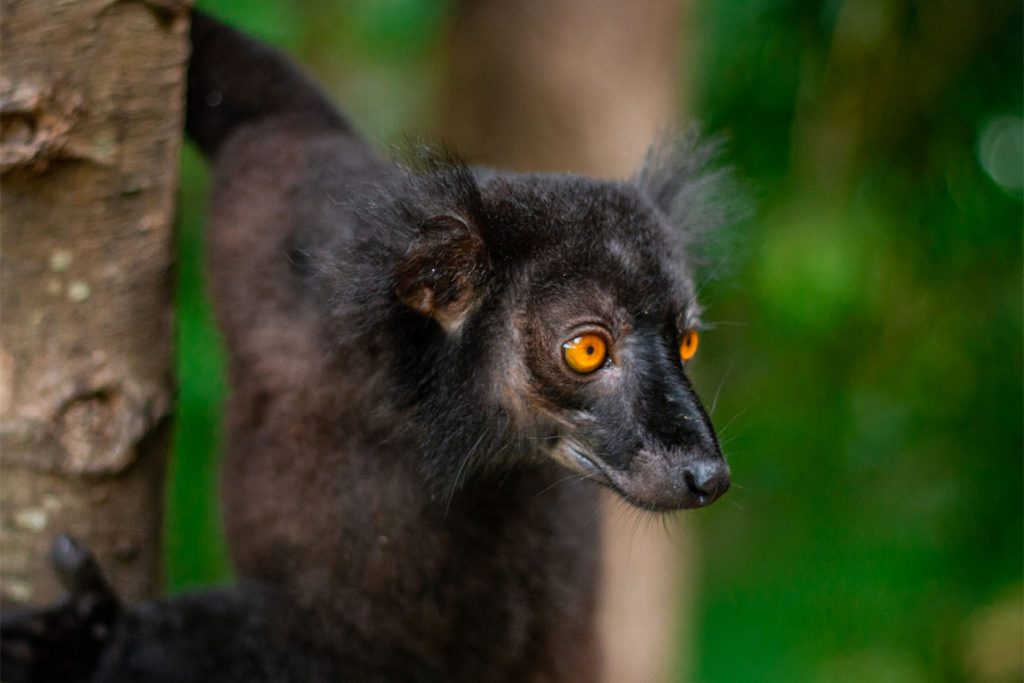- Overview
- Itinerary
- Rates
- Accommodation
- Included
- Excluded
- Flights
- Sustainability
- Gallery
Immerse yourself in the Cape Whale Coast Marine Ecosystem
Embark on an expedition to Gansbaai, South Africa, an area renowned for its Marine Big 5 – the great white shark, the southern right whale, the bottlenose dolphin, the Cape fur seal, and the African penguin! This is your chance to witness these incredible animals in their natural habitat within the Cape Whale Coast and Dyer Island ecosystem. You’ll actively engage in award-winning conservation projects, working with sharks, whales, penguins and other marine species, while contributing to ecotourism, research and education efforts.
Explore and protect a world beyond the shoreline
As fellow ocean-lovers, we understand the deep connection with the sea. Our aim is to nurture that bond and build a sense of responsibility and advocacy to help protect our oceans. When you join our penguin, dolphin and whale conservation program, you’ll get involved in key activities like species identification, habitat monitoring and marine research which will contribute to long-term conservation efforts.
Waters teeming with marine life
The Dyer Island ecosystem truly is an ocean-lover’s paradise, densely populated with a diverse array of unique marine species. Migratory marine life found in these waters include great white sharks, humpback whales, southern right whales, bottlenose dolphins and common dolphins. Species spotted year-round include Bryde’s whales, bronze whale sharks, broadnose sevengill sharks and short-tailed stingrays – one of the largest species of stingray! The area also boasts around 60,000 Cape fur seals, usually found soaking up the African sun on Geyser Rock. Dyer Island is also a hotspot for bird enthusiasts, home to endangered African penguins and other pelagic birds like the Cape cormorant. The Uilenkraal estuary is a birder’s dream spot with diverse bird species, so bring your binoculars along!
A popular coastal village
Tucked away in the Overberg district of the Western Cape Province along the stunning Cape Whale Coast and in the heart of the Cape Floral Kingdom is the picturesque fishing village of Gansbaai – 2.5 hours from Cape Town. The area attracts around 80, 000 visitors each year, eager to explore its diverse marine life. Nature-lovers head out to sea, hoping for encounters with the famous Marine Big 5 found within the Dyer Island ecosystem. Thrill-seekers unite in these waters, feeding their adventurous spirits as they sail through the popular Shark Alley. For whale enthusiasts, time your visit between June and October, and you could witness the annual whale migration in Walker Bay. Take a journey through history with a visit to the De Kelders Caves – a local cave system of great archaeological significance and a natural heritage site of South Africa. Or go to the scenic Cape Agulhas, where oceans collide at the southernmost tip of Africa.
What to expect on this award-winning marine conservation expedition
On this 7 day, 6 night expedition, you'll join hands-on marine conservation experiences like whale monitoring, rehabilitation of endangered African penguins and shark research. Here’s a glimpse of what you can expect:
- Knowledge sessions: Engage in expert-led sessions covering shark behaviour, marine biology and conservation.
- Shark cage diving research: Hone your identification skills and contribute to shark research during cage diving sessions.
- Boat crew support: Assist the shark cage diving boat crew, ensuring a smooth experience for participants.
- Whale/dolphin observation: Join boat excursions for whale and dolphin species identification, contributing to data collection.
- Penguin sanctuary engagement: Contribute to African penguin well-being through hands-on tasks at the sanctuary.
- Community involvement: Take part in marine conservation initiatives, including beach cleanups and community outreach.
See the itinerary for an example of what you can look forward to >
Physical rating: 3/5.
Moderate physical activities are included and a good level of fitness is required.
No two days are the same along the Atlantic Ocean
Each day holds its own suspense, adventure and surprises. But one thing is guaranteed – magic. Every day on your expedition will be a combination of exciting marine activities, conservation research experiences, and relaxation. Greet each sunrise with a hot cup of coffee or tea. Head out for your morning activity, then enjoy breakfast back at the base followed by free time to lounge around, read a book or take a nap. At the end of each day, you’ll enjoy a delicious meal together and share stories.
The actual itinerary for this expedition will be structured around your required dates after submitting the enquiry form. Below is an example of the activities and project work that you might get involved in on this Expedition.
Itineraries
Activity 1
Arrival at your home away from home
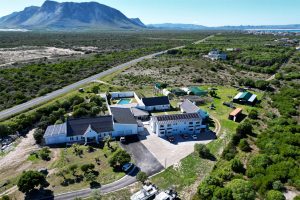
Transfer and arrival:
"Howzit!" Welcome! You'll be met at Cape Town International Airport (or your hotel, if over-nighting) and transferred by road along the scenic Whale Coast Route to Gansbaai. After arrival at the Marine Volunteer Centre, settle in and explore the facilities (see accommodation tab for more info).
Activity 2
Training sessions
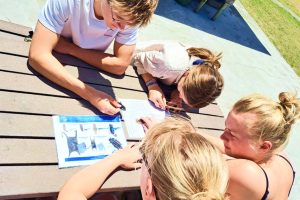
Learn about shark behavior, biology and marine conservation. Educational lectures by leading experts cover topics from marine research advancements to ethical considerations, ensuring a well-rounded understanding of marine science.
Activity 3
Shark cage diving
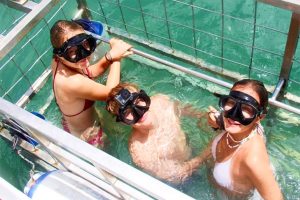
Engage in species identification, refining your skills to recognize and catalog diverse marine life. You’ll actively contribute to ongoing research by collecting data on species like bronze whaler sharks, broadnose sevengill sharks, short-tailed stingrays, and great white sharks (only occasionally spotted).
Activity 4
Whale/dolphin species identification

Go out on a boat to conduct cetacean data collection. Taking part in a fin identification process, you'll record behaviour and the number of species and individuals you've seen.
Activity 5
Penguin sanctuary engagement
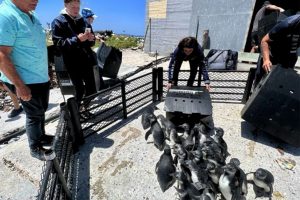
Engage in hands-on tasks and contribute to the well-being of endangered African penguins through activities like cleaning enclosures and preparing nutritious fish meals. You'll assist in feeding, gaining valuable experience in the specialized process of nourishing seabirds back to health. You'll actively support the rehabilitation team at the African Penguin and Seabird Sanctuary.
Activity 6
Vessel crewing
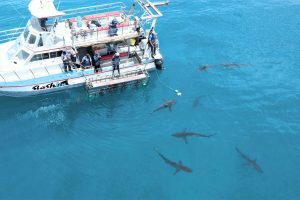
You'll assist the boat crew and tourists on our shark cage diving boat. Typical assistance takes place pre- and post-cage diving and might include assisting with equipment, towels, making warm drinks and taking care of tourists who might be suffering from sea sickness.
Activity 7
Engage with South African community projects
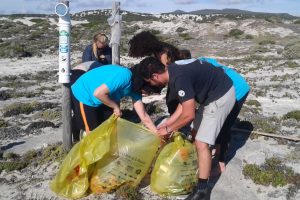
Beyond research, this expedition program includes marine conservation initiatives such as beach clean-ups, environmental awareness campaigns, and community outreach. Participants
contribute to promoting sustainable practices, gaining a holistic view of marine conservation challenges and opportunities.
Activity 8
A typical day
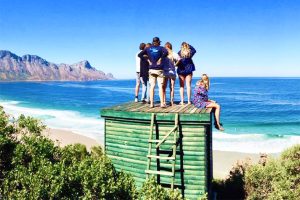
Just like anywhere else, each day is different and your involvement depends on your interests, knowledge and the activities happening at the time. Below is an example of a typical day's activity schedule for volunteers:
07:00 Make your own breakfast (and packed lunch) at the volunteer house with the supplies provided.
07:30 Volunteers leave the house and travel to their project (times for all activities change on a daily basis).
07:45 Assisting at APSS (African Penguin & Seabird Sanctuary) with rehabilitation through hands-on activities like cleaning enclosures and preparing nutritious fish meals.
09:00 Assist with project activities on whale or shark vessels.
13:00 Take a break and enjoy your packed lunch with the rest of the team while reflecting on the mornings activities.
15:00 Take part in conservation activities such as beach & fishing line bin cleanups or supporting environmental awareness campaigns and community outreach to promote and sustainable practices.
17:00 Work usually ends for the day depending on the project activity.
17:30 Practical or lecture on research and conservation skills with a local expert; or free time to relax at the volunteer house, or do some shopping.
19:00 Dinner: You can choose to make your own dinner, eat out at a restaurant, or get take out.
FREE TIME:
Every day is an activity day unless weather is not good to go to sea or prior arrangements are made by the coordinator. Off-day activities/excursions can be planned through the coordinator e.g. Day excursion to Hermanus or Cape Agulhas (most southern tip of Africa), cave/mountain hikes, horseback riding on the beach, beach cleanup's, etc.
$1,945* per person for the full trip duration
*Valid to December 30, 2024. This daily rate is an indication only as prices may vary according to your specific requirements. A quotation for this trip will be emailed to you after submitting the Trip Enquiry.
2025 rate: $2,045 per person - valid January 01 to December 30, 2025.
Terms: All bookings are subject to availability and single supplements may apply.
It’s easy to be reeled in by the tranquil lifestyle of the Gansbaai community. GVI's volunteer houses mirror that minimalist beachtown aesthetic that keeps people coming back to the charming fishing village.
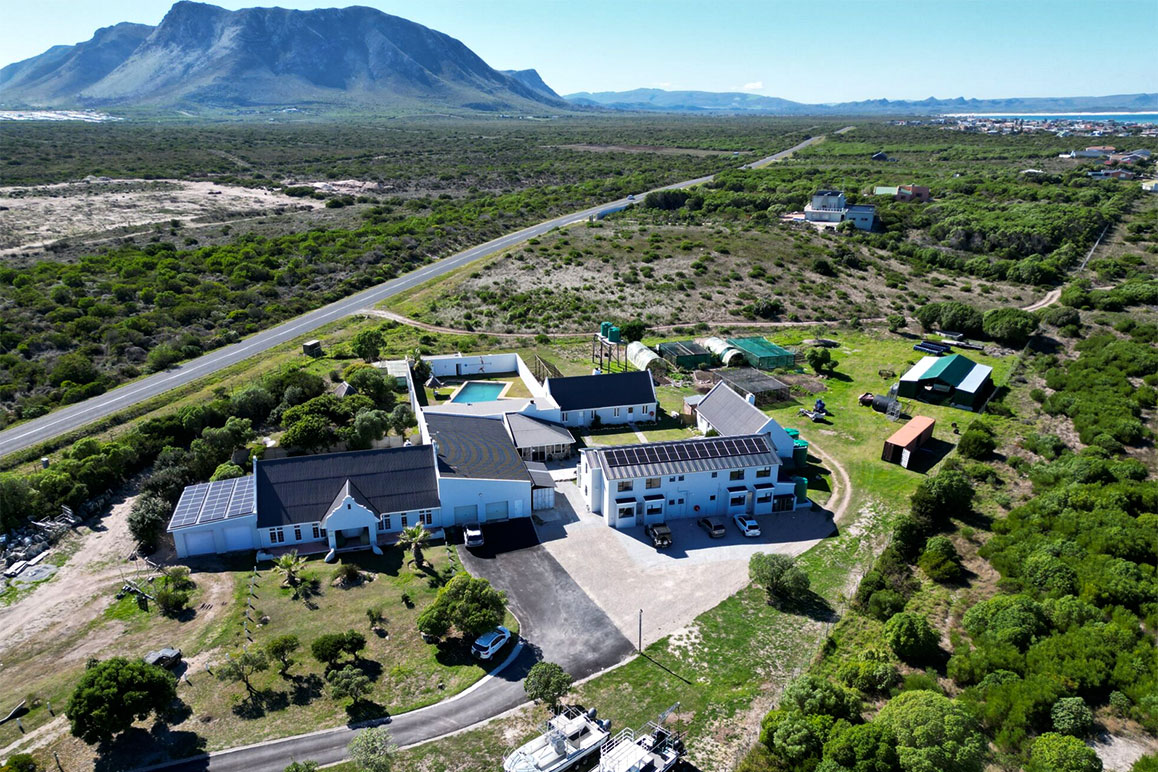
You’ll stay in dorm-style accommodation comprising four cottages, each with a sleek design, and a new building that can accommodate up to 40 individuals. Sleeping arrangements and bathrooms are shared, with bedding and a weekly cleaning service provided.

Each unit has a kitchenette, but the main cooking takes place in the communal kitchen, along with a nearby dining room and sitting area – perfect for bonding over a delicious meal!

Other amenities include a lecture room, workspaces, a pool for those hot, summer days and an activity hall with weights, table tennis, pool, foosball and various board games.
Stay connected with Wi-Fi and satellite TV, and there’s an inverter for power outages. It’s not just comfortable – it’s the perfect space for a fantastic experience!
- Conservation activities
- Shark cage dive
- Boat excursions
- Guided snorkeling, hikes and walks
- Highly qualified and experienced instructors and field staff
- Accommodation (see tab)
- All Meals
- Pre-departure support
- 24-hour Emergency desk
- Arrival and departure transfers.
- Flights (see tab to book flights)
- Visas
- Vaccines
- Medical insurance
- Travel insurance
- Personal belongings insurance
- Cancellation insurance
- Personal gear and kit
- Soft drinks and alcoholic beverages
- Additional spending money
- Gratuities.
You will need to book your own flights to and from Cape Town International Airport (CPT). Our handy airline aggregator will find the best seat prices for your dates.
Note:
- We strongly advise waiting to book your flight until your Expedition trip is confirmed, as we need a minimum number of participants to proceed.
- You can always come back to this tab and book flights later.
- If you decide to book flights earlier, please opt for flexible tickets to accommodate potential changes.
Sustainable Development Impact
While the United Nations Sustainable Development Goals (SDGs) are global concerns, and not aimed specifically at the travel and tourism industry, target 8.9 of the 2030 Agenda aims to "by 2030, devise and implement policies to promote sustainable tourism that creates jobs and promotes local culture and products". In this regard, tourism has the potential to contribute, directly or indirectly to all 17 SDGs.

Travel with Purpose
GVI Global’s expeditions and volunteer programmes address all 17 SDGs. In particular, GVI prioritizes 10 critical global issues affecting both people and the planet:
- Plastic pollution and litter,
- Climate change,
- Endangered species,
- Biodiversity loss,
- Sustainability,
- Early childhood development,
- Education for both children and adults,
- Gender equality,
- Health, and
- Justice, equity diversity, and inclusion.
Considering the track history and documented evidence of GVI's commitments to conservation and community upliftment, Naturecrazi considers their respective SDG "qualifying criteria" as follows:
- SDG 1: Creates fixed term and permanent job opportunities for local communities and aims to support people harmed by climate-related extreme events and other economic, social, and environmental shocks and disasters.
- SDG 2: Aims to end hunger, achieve food security, improve nutrition, and promote sustainable agriculture.
- SDG 3: Ensures healthy lives and promotes well-being for all at all ages.
- SDG 4: Contributes to sustainable local community development through education programs and research.
- SDG 5: Aims to achieve gender equality by ending all forms of discrimination, violence, and any harmful practices against women and girls.
- SDG 6: Provides for careful handling and disposal of solid waste and sewage. Uses alternative, sustainable means of water acquisition and reduces water consumption.
- SDG 7: Meets its energy needs through passive design and renewable energy resources.
- SDG 8: Promotes economic growth, full and productive employment, and decent work for all.
- SDG 9: Builds resilient infrastructure, promotes sustainable industrialization, and fosters innovation.
- SDG 10: Reduces inequality within and among countries.
- SDG 11: Makes human settlements inclusive, safe, resilient, and sustainable.
- SDG 12: Encourages sustainable consumption and production patterns through various measures, including the management of materials that are toxic to the environment.
- SDG 13: Takes urgent action to combat climate change and its impacts by improving education and awareness-raising on climate change mitigation, adaptation, impact reduction and early warning.
- SDG 14: Conserves and sustainably uses the oceans, seas and marine resources for sustainable development.
- SDG 15: Conserves and rehabilitates the surrounding flora and fauna. Aims to protect, restore, and promote sustainable use of terrestrial ecosystems, sustainably manage forests, combat desertification, and halt and reverse land degradation and halt biodiversity loss.
- SDG 16: Aims to promote peaceful and inclusive societies for sustainable development, provide access to justice for all, and build effective, accountable, and inclusive institutions at all levels.
- SDG 17: Aims to strengthen the means of implementation and revitalize the global partnership for sustainable development in 2030.


